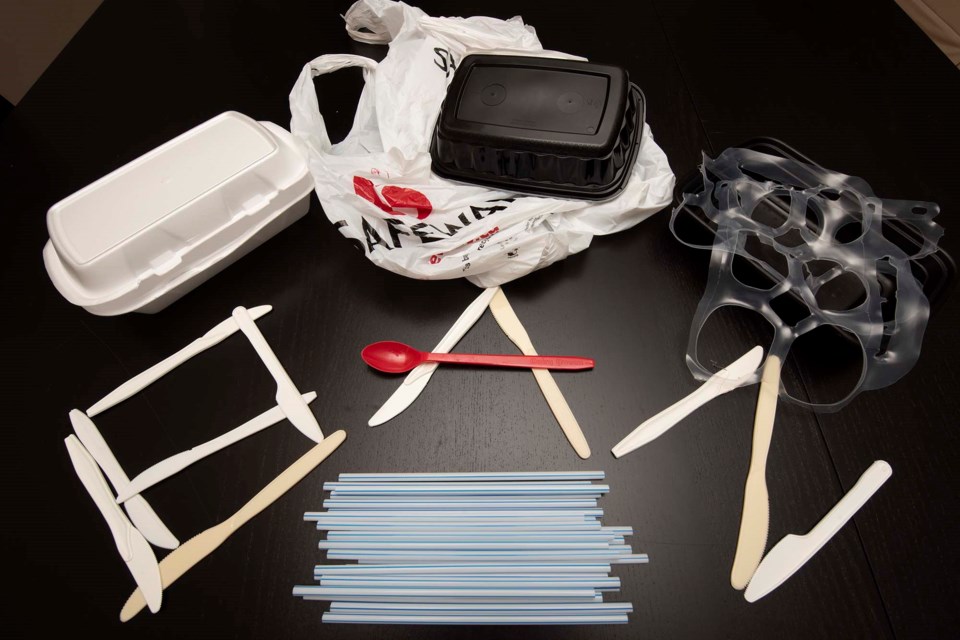St. Albert residents say the city should use bans and fees to cut down on waste from single-use items, a recent survey suggests — measures the City of Vancouver has already put into effect.
The City of St. Albert published a report May 31 on a survey on the city’s single-use item reduction strategy.
In 2019, St. Albert council launched a $96,000 study into a strategy to reduce waste caused by single-use items such as plastic bags, straws, and coffee cups. The strategy was supposed to roll out in April 2020 but was delayed due to the COVID-19 pandemic.
The city held an online survey on the strategy from April 9 to May 8 to gather information on how the city uses single-use items and how the city could reduce their use. Some 56 residents and three business owners responded to it.
Survey results
The survey report noted that single-use items account for about half the world’s plastic waste. Edmonton, Vancouver, and Toronto are all working toward eliminating or reducing single-use items.
When asked to choose which of six items (check-out bags, straws, takeout containers, to-go drink cups, utensils, and other) the strategy should target for reduction, residents were most likely to pick check-out bags, the survey found. Takeout containers and drink cups were also common responses, as were clamshell containers and individually packed items.
Most survey respondents said they often/always brought their own bags to stores, but never or rarely brought their own containers or utensils, the report said. Residents supported fees or bans on checkout bags, bans and voluntary measures for straws, and discounts for bringing their own containers, cups, and utensils.
Real-world results
Single-use items are a minor part of the waste stream by weight, but have major environmental impacts in the form of litter, microplastics, greenhouse gases, and harm to wildlife, noted Christina Seidel, executive director of the Recycling Council of Alberta. They are also unnecessary.
“Why do we have straws in the first place?” she said as an example — very few people need them, and you can bring a reusable one if you do.
While the federal government wis supposed to ban several single-use plastic items later this year, Seidel said it wis still important for municipalities to act on items not covered by the ban, especially if that ban fails to materialize.
Seidel said Vancouver is leading the charge on single-use item reduction in Canada, having worked on the issue since 2016.
Single-use items cost Vancouver some $2.5 million a year in cleanup costs, said Monica Kosmak, senior project manager for Vancouver’s single-use item reduction strategy. A survey found 88 per cent of Vancouverites wanted the city to take action on these items.
Kosmak said Vancouver is rolling out a series of bylaws to address single-use items after three years of consultation.
“Any single-use item no matter what it is made of can have environmental impacts,” she noted, so the city tailored its laws to encourage people to switch to reusable items instead of non-plastic, single-use ones.
Vancouver started by banning Styrofoam cups and takeout containers in January 2020, as they are exceedingly tough to recycle and many alternatives are available. Kosmak said the city has seen good uptake on the ban, although the pandemic has made it tough to determine its actual results.
A ban on plastic straws followed in April 2020, as well as a requirement for businesses to provide disposable utensils only on request. Kosmak noted that Vancouver specifically requires stores to stock flexible plastic straws and to provide them on request to help people who actually do need straws.
Vancouver banned plastic shopping bags in January, and imposed a fee on new paper and reusable bags. Kosmak said the fees on bag alternatives are meant to change habits so people will remember to bring their reusable bags instead of constantly buying new ones. Stores keep these fees to pay for the cost of providing alternative bags.
Vancouver became the first place in Canada to put a fee on disposable cups in January. Kosmak said the city went with a fee (which businesses keep to pay for new dishwashers or reusable cups) instead of a ban as there are few alternatives available for some cups.
Next steps
Seidel and Kosmak said Vancouver has seen new businesses emerge as a result of these measures. Reuseables.com now provides reusable takeout containers, for example, while Tim Hortons and McDonalds have signed on with “cup-share” companies which let customers pay a refundable deposit to borrow a reusable cup.
“It’s like car-share or bike-share but for cups,” Kosmak said.
St. Albert crews will track single-use item litter in the city this summer and conduct a waste audit to determine which items are most prevalent, the survey report said.
Administration will have a single-use item reduction strategy before council in late 2022.
The survey report can be found at conversation.stalbert.ca/suirs.




